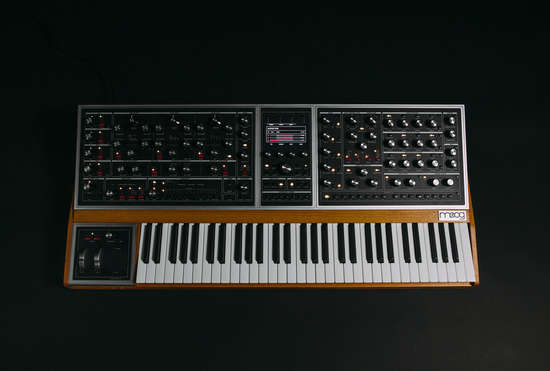Behind the Design of the New “Moog One”—1st Polyphonic Moog in 30 Years
Moog just announced their first polyphonic synth in over 30 years called the Moog One, which aims to rival the classic Memorymoog.
Gordon Reid of Sound on Sound shares his behind-the-scenes experience bug-testing the Moog One, creating patches for the unit, and speaking with its developers. On top of that, Sound on Sound has published multiple images of the new synthesizer. (And it looks phenomenal.)
There was an undeniable demand for this synth, as was evident with compounding pressure at every trade show. Amos Gaynes states that “for several years, almost every conversation at every trade show had included the question, ‘when are you going to build a new Memorymoog?’ and the pressure just grew and grew. To an extent, this told us that we had to build one.”
Moog began conducting extensive market research back in 2013, investigating what consumers were expecting from this new synth via, what Reid calls, “conceptualization meetings.” These meetings took place with key players in the industry over the span of two years. Upon gathering a massive amount of feedback, Moog began hardware development in 2015.
Cyril Lance is Moog’s Chief Engineer and states that “There are something like 14,000 components in the Moog One which together add up to 48 oscillators and 32 filters on no fewer than 16 printed circuit boards, plus three arpeggiators and three sequencers, five effects units, all comprising three separate polyphonic synthesisers… all of which total just one musical instrument.”
The Moog One was built with the intention of overthrowing the Memorymoog. Reid says that “In contrast, the One offers far greater flexibility. Sure, it can fulfil the role of a 21st century Memorymoog, but its palette is much wider, ranging from delicate and aetherial pads to the most powerful monosynth leads and basses.”
With an impressive array of features, the Moog One comes with a steep price tag. Although it is not yet available for purchase, it has made an appearance on at least one retailer’s website, with the 8-voice Moog One priced at $5,999 and the 16-voice Moog One priced at $7,999. To learn about Reid’s in-depth experience with the development of the Moog One, read the full article at Sound on Sound.
Charles Hoffman is a Mixing and Mastering Engineer at Black Ghost Audio. After graduating from the University of Manitoba with an English degree, Charles completed his education at Icon Collective in Los Angeles, CA.
Please note: When you buy products through links on this page, we may earn an affiliate commission.







